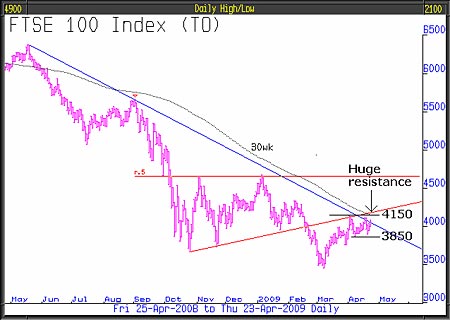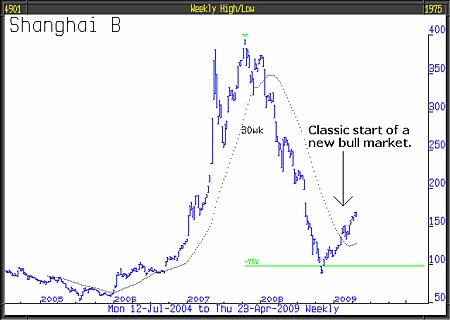Get the latest financial news, insights and expert analysis from our award-winning MoneyWeek team, to help you understand what really matters when it comes to your finances.
You are now subscribed
Your newsletter sign-up was successful
Want to add more newsletters?

Twice daily
MoneyWeek
Get the latest financial news, insights and expert analysis from our award-winning MoneyWeek team, to help you understand what really matters when it comes to your finances.

Four times a week
Look After My Bills
Sign up to our free money-saving newsletter, filled with the latest news and expert advice to help you find the best tips and deals for managing your bills. Start saving today!
Technically, FTSE's position has become very interesting. It has, together with most of the developed world's indices, stalled at the very level that we expected and as the chart below illustrates, conditions have since moved on to form a short-term consolidation.
That short-term consolidation has two important levels, the high of 4150 and the low of 3850. Going forward, there can be only one of two outcomes; either a return to strength by exceeding 4150 or, on weakness, a fall below 3850, which would confirm a short-term top of considerable importance.
It must be said, the latter of those two outcomes is the one we expect because the economic/investment conditions have not materially improved to such an extent that a new bull market could be envisaged. All we have had is a short period of some less bad data and some typical, as you would expect, very optimistic comments by the likes of Barack Obama, Gordon Brown, Angela Merkel, Tim Geithner, etc.
MoneyWeek
Subscribe to MoneyWeek today and get your first six magazine issues absolutely FREE

Sign up to Money Morning
Don't miss the latest investment and personal finances news, market analysis, plus money-saving tips with our free twice-daily newsletter
Don't miss the latest investment and personal finances news, market analysis, plus money-saving tips with our free twice-daily newsletter

To restart the bull market, banks need to be adequately recapitalised and willing to lend; even if they achieve that, it would also require consumers and business to return to borrowing.
Over this last two weeks we have picked a selection of interesting items which would appear to give hope for a new bull market and a number that do not.
For economic recovery and a new bull market
Barack Obama said "Impressive efforts to boost the economy are starting to bear fruit even though recovery would cause more pain this year."
Ben Bernanke, Chairman of the Federal Reserve, said "The economy is no longer 'falling off a cliff'."
CBI "Worst of recession over." Ian McCafferty, Chief CBI Economist said "The rate of contraction will moderate quite noticeably in the second quarter of this year."
"Germany could be nearing the bottom of its sharp economic downturn," said Angela Merkel.
Tim Geithner said "The large majority of banks had sufficient capital."
Against economic recovery and a continuing bear market
US industrial production, year to March, fell 12.8% - the fastest rate since the end of World War II.
Eurozone industrial production in February fell 2.3% versus January and 18% compared to a year ago. The biggest decline since records began in 1990.
Globally economic activity and employment continues to contract.
Although some of the recent data has been a little less bad and some even a little better, there are other developing problems which represent a significant threat to the economy and to asset values.
According to Standard & Poor's, this year, worldwide, there have been 68 defaults by global debt issuing companies, of which 35 occurred in March. Quite clearly it is serious that the rate of default is accelerating.
The rating agencies are downgrading at a near record pace. More companies had their rating cut to junk in March than in any month since the Asian financial crisis of 1997. In March, 17 companies were downgraded compared to an average of six per month for the previous 12 months acceleration.
Another burgeoning problem is the commercial property market and commercial property mortgages.
In the US, first quarter 2009, vacancy rates at shopping malls rose 9.8%.
In March, US banks seized 464 commercial properties, valued $7 billion three times the number in December more acceleration.
Last year, US commercial property sales fell 73%.
At the end of 2008, US office space, vacancies rose to 14.5% and is expected to worsen.
What's coming towards us is truly daunting. The forces at work until 2007 that drove asset prices to ridiculous highs have ended and won't come back for years to come.
The pre-2007 period of share buy-backs and private equity funded by limitless and mindless lending has been followed by a period of equity issuance and a collapse of lending.
The period of borrowing and spending has been followed by a period of saving and debt repayment.
The willingness of banks to lend to anybody as much as they wanted, has been followed by a period of very tight lending - whilst their balance sheets remain weak, banks don't want to lend, other than to the very best propositions. There is a growing lack of willingness to borrow by both businesses and consumers.
Martin Wolf, this week in a Financial Times column headlined Why the 'green shoots' of recovery could yet wither,asked: "Is the worst behind us?"
He answered: "In a word, No" - explaining - "The rate of economic decline is decelerating. But it is too soon even to be sure of a turn-around, let alone a return to rapid growth Complacency is perilous. These are early days." He ends what is an enlightening article by saying "The brutal truth is that the financial system is still far from healthy, the deleveraging of the private sectors of highly indebted countries has not begun, the needed rebalancing of global demand has barely even started and, for all these reasons, a return to sustained private-sector-led growth probably remains a long way in the future."
We reported in the previous issue of the threesixty newsletter that the model portfolio had purchased a 7.5% Chinese stock market position. So far this has performed satisfactorily. Since making that investment decision, Goldman Sachs have published a very bullish view on China, having raised its forecast for the economy to grow by 8.3% this year and saying that shortly it could soon become the second biggest economy in the world, dethroning Japan. It is also our view that China is on its inevitable route to be becoming the biggest economy in the world.

A study of the Shanghai 'B' chart and its positive break above the 30-week moving average leaves us in no doubt whatsoever that technically this should be the start of a major bull market. The latest data is very encouraging the infrastructurebased stimulus packages are proceeding satisfactorily; bank lending has risen very strongly and consumer spending is increasing. There is a genuine possibility of an important decoupling. Going forward, the Chinese stock market and some other emerging markets could well continue their bull market condition, even as the developed world's markets spiral downwards again.
This article was written by Full Circle Asset Management, and was published in the threesixty Newsletter on 24 April 2009
Get the latest financial news, insights and expert analysis from our award-winning MoneyWeek team, to help you understand what really matters when it comes to your finances.
MoneyWeek is written by a team of experienced and award-winning journalists, plus expert columnists. As well as daily digital news and features, MoneyWeek also publishes a weekly magazine, covering investing and personal finance. From share tips, pensions, gold to practical investment tips - we provide a round-up to help you make money and keep it.
-
 New PM Sanae Takaichi has a mandate and a plan to boost Japan's economy
New PM Sanae Takaichi has a mandate and a plan to boost Japan's economyOpinion Markets applauded new prime minister Sanae Takaichi’s victory – and Japan's economy and stockmarket have further to climb, says Merryn Somerset Webb
-
 Plan 2 student loans: a tax on aspiration?
Plan 2 student loans: a tax on aspiration?The Plan 2 student loan system is not only unfair, but introduces perverse incentives that act as a brake on growth and productivity. Change is overdue, says Simon Wilson

